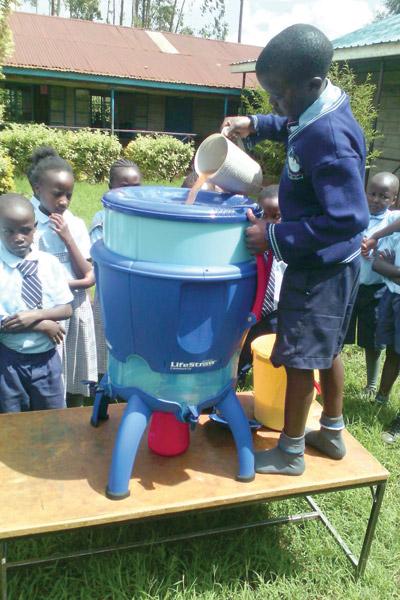
In the time it takes to read this article, children will die from sickness related to unsafe drinking water. According to Rotary Water Projects in the Fort Lauderdale, Fla., chapter, 80 percent of illness in the world is traced to unsafe water and it claims the lives of children every eight seconds.
Thanks to Our Lady of the Holy Souls Church in Little Rock in partnership with the Rotary Club of Little Rock (Club 99), students in the Homa Bay area schools in Kenya will not become a statistic.
In December, parishioners raised $6,500 to purchase water filtration systems called Lifestraw Community and on March 8, Club 99 made it an even $10,000 with an additional $3,500 donation.
“I think we just take (clean water) for granted; we never think about turning on the facet and water coming out,” said pastor Father Erik Pohlmeier.
While clean water is often hard to find in rural parts of the world, with Rotary explaining many on average have to travel miles for it, it has most recently come to widespread attention in the United States in Flint, Mich., where residents are still struggling with lead-tainted water. (See sidebar at arkansas-catholic.org)
“The problem in Flint is raising people’s alarms a little bit,” Father Pohlmeier said. “It raises the awareness that not everybody just has (clean water).”
When the Year of Mercy kicked off in November, Holy Souls came up with a monthly plan to live out the 14 corporal works of mercy for the year. In December, the focus was both “welcoming the stranger and giving drink to the thirsty,” Father Pohlmeier said. An online search of water purification efforts and clean water projects led him to the Rotary Club.
For the past eight years, the Rotary Club of Fort Lauderdale has donated $1 million, saving the lives of more than 800,000 students in Africa through safe drinking water. The club buys the filter systems, which cost approximately $298 each, through Replenish, a ministry-based nonprofit in Arlington, Texas. The nonprofit then contacts LifeStraw in Africa, which distributes the LifeStraw systems and provides education on maintenance for the locals. Club 99, with the help of parishioner and Rotary Club member Hank Kelley, helped make that connection with the Fort Lauderdale chapter.
“The larger ones provide clean water to people for three years,” Father Pohlmeier said. “We bought one so we can use as a visual for the month of December,” displayed in the parish. Money was collected in the water filter for the month, which had photos displayed of the filter being used in Africa.
“You take the top off and it’s a pretty good collection plate,” Kelley said. “Every Sunday people would put more money and more checks in.”
The parish filter was raffled off at a parish event, Father Pohlmeier said.
Barbara Lamb, co-founder of Replenish, said in a news release that the $10,000 donation will provide clean water for up to 10 schools in the Homa Bay area. The money will go toward more than 30 filters.
“They’ve offered to document the real life setting of where (the filters) go and get that feedback to us,” with photos and information about the schools, Kelley said.
Though it was merely a month-long effort for the parish, the impact will stretch well into the future.
Each system purifies 50 liters of water for about 60 to 70 students for three years. After three years, $75 filters are bought every three years to continue extending the life of the system. The dirty water is poured into the top of the unit, leaving about 25 liters of dirty water on the top and 25 liters of clean, filtered water on the bottom. Children can gather around the four spigots to fill their cups.
Having it available for students at a school is “practical,” Kelley said, serving children first, but also adults.
“It’s easier to have a (water) resource where people gather,” Kelley said.
Martin Brody, founder of the Rotary Water Project, said he does not know when the filters will arrive in Kenya, but when they are set up in the schools, it will be life-saving, as many now have to seek out lakes and rivers that are unclean.
“They die,” Brody said without clean water, without water filters. “(Children) die every minute due to the lack of clean drinking water.”
Please read our Comments Policy before posting.
Article comments powered by Disqus Apply now for diocesan School of Spiritual Direction
Apply now for diocesan School of Spiritual Direction
 Veterans Day Mass honors service and God’s soldiers
Veterans Day Mass honors service and God’s soldiers
 A Catholic You Want to Know: Debbie King
A Catholic You Want to Know: Debbie King
 Bishop Pohlmeier visits state to ask, ‘How's it going?’
Bishop Pohlmeier visits state to ask, ‘How's it going?’
 Wendy Saer makes her mark on the next generation
Wendy Saer makes her mark on the next generation
 New season of ‘The Chosen’ delayed on streaming sites
New season of ‘The Chosen’ delayed on streaming sites
 Father Keller, oldest diocesan priest, a pro-life champion
Father Keller, oldest diocesan priest, a pro-life champion
 Vatican says abortion, surrogacy attack human dignity
Vatican says abortion, surrogacy attack human dignity
 Iowa basketball superstar supported by Catholic faith
Iowa basketball superstar supported by Catholic faith
 A Catholic You Want to Know: Joan Becker
A Catholic You Want to Know: Joan Becker
 Two gifts after Jesus’ death: Virgin Mary and Eucharist
Two gifts after Jesus’ death: Virgin Mary and Eucharist
 Why we have an altar, and not just a communion table
Why we have an altar, and not just a communion table
 Pope: Wars should be resolved through nonviolence
Pope: Wars should be resolved through nonviolence
 Living relationship with Jesus Christ in the Eucharist
Living relationship with Jesus Christ in the Eucharist
 Crosses: Adversities you could avoid, but are embraced
Crosses: Adversities you could avoid, but are embraced